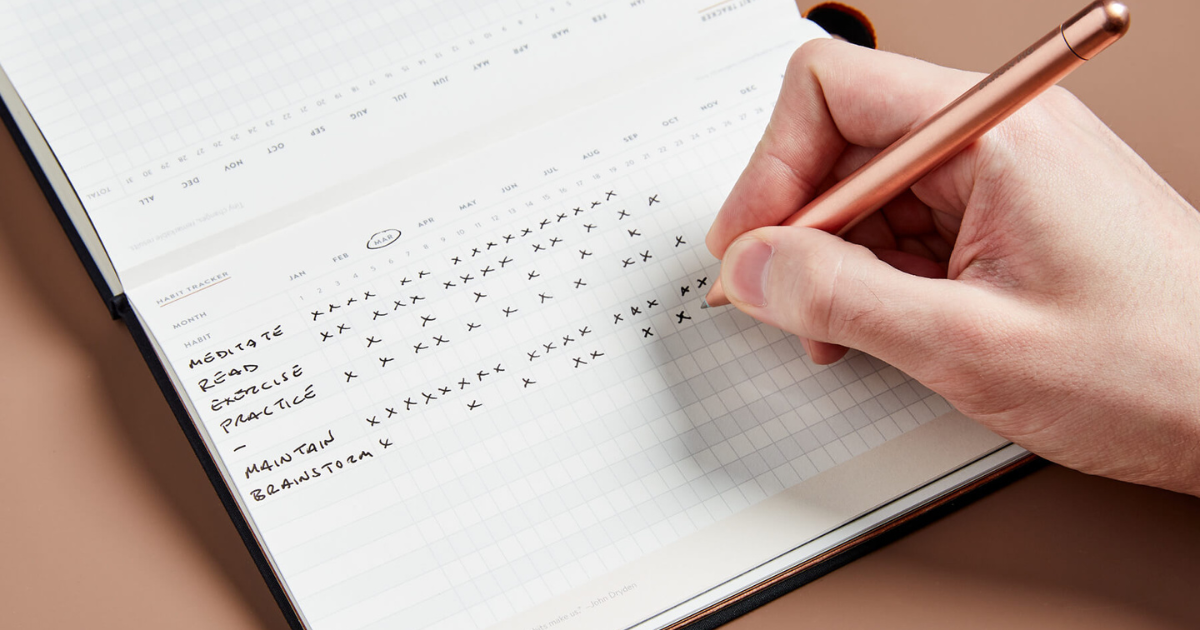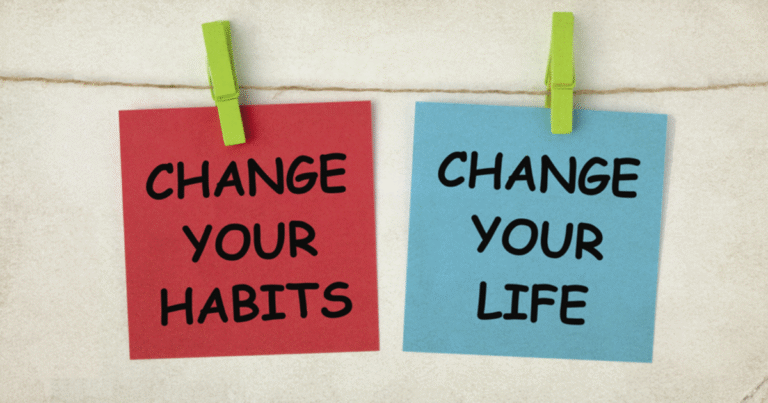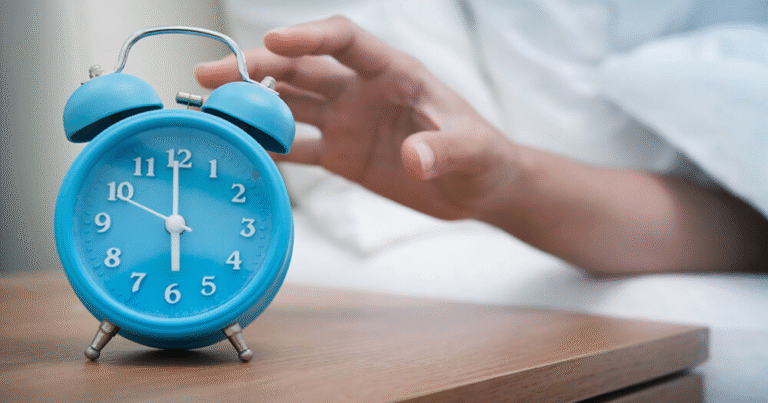What Daily Rituals Should I Track

Table of Contents
Tracking your daily rituals can really boost your well-being and productivity. By keeping an eye on your habits, you can spot areas for improvement. This helps you make smart choices to increase your efficiency.
You can track habits related to physical health, mental well-being, and personal productivity. Knowing these areas helps you create a balanced routine. This supports your goals.
Key Takeaways
- Identify the most impactful daily rituals to track for your personal goals.
- Understand the different categories of habits that can be monitored.
- Learn how tracking habits can improve productivity and well-being.
- Discover tools and methods for effective habit tracking.
- Start creating a personalized habit tracking plan.
The Power of Tracking Daily Rituals
Tracking your daily rituals can unlock a healthier, more productive you. This simple practice lets you see your daily routines and make changes for better wellbeing.
Why Habit Tracking Leads to Behavior Change
Tracking habits makes you more aware of your daily actions and choices. It helps you spot patterns and areas for improvement. This leads to positive changes and healthy habits.
The Science Behind Habit Formation
Habit formation is based on psychology and neuroscience. Knowing how habits form can help you use habit tracking to reach your goals.
The Habit Loop: Cue, Craving, Response, Reward
The habit loop is key to understanding habit formation. It has four stages: cue, craving, response, and reward. Recognizing the cue can help you understand your motivations.
- Cue: The trigger or prompt that sets off the habit.
- Craving: The underlying motivation or desire that drives the habit.
- Response: The behavior or action taken in response to the cue and craving.
- Reward: The benefit or payoff received as a result of the behavior.
How Long It Really Takes to Form a Habit
Many think it takes 21 days to form a habit. But research shows it varies greatly. Understanding habit formation helps set realistic goals and strategies.
Essential Daily Rituals to Track for Physical Health
To stay healthy, it’s key to watch your daily rituals. Tracking the right habits helps you make better choices for your health.
Water Intake and Hydration
Drinking enough water is crucial for your body. It transports nutrients, eliminates waste, and helps maintain the proper temperature in your body.
Optimal Daily Water Consumption Goals
Most say to drink eight glasses of water a day. But, your needs might change based on where you live, how active you are, and your health.
- Keep an eye on how much water you drink to hit your daily goal.
- Change how much water you drink based on your activity and where you live.
Sleep Duration and Quality
Good sleep is key for your body to fix and refresh itself.
Tracking Sleep Cycles and Recovery
Watching your sleep can show you how well you’re sleeping and where you can get better.
- Check if you’re sleeping enough to rest well.
- Focus on your sleep cycles to sleep better.
Physical Activity and Step Count
Being active is important for your health. Tracking your steps is a good way to see how active you are.
Beyond Steps: Movement Variety Tracking
While steps are important, don’t forget to track other activities like strength training and stretching.
- Use a fitness tracker or pedometer to keep an eye on your steps.
- Make sure to mix up your activities every day.
Nutrition Habits Worth Monitoring Daily
Tracking your daily food intake is a productive habit that boosts your nutritional balance and health. By watching your nutrition habits, you can make smart diet choices. This helps you build positive habits that improve your well-being.
Meal Timing and Frequency
Knowing when and how often you eat affects your metabolism and energy. By tracking your meal times and how often you eat, you can spot patterns that might harm your health.
Eating smaller, more frequent meals can keep your energy stable. But skipping meals can make you eat too much later in the day.
Protein, Carb, and Fat Intake
It’s key to track your macronutrient intake to fuel your body right. By watching your protein, carb, and fat intake, you can tweak your diet to meet your health goals.
- Protein is vital for muscle repair and growth.
- Carbohydrates give you energy for daily tasks.
- Fats are important for hormone production and brain function.
Portion Control and Mindful Eating
Practicing portion control and mindful eating can improve your food relationship. By listening to your hunger and fullness, you can avoid overeating and enjoy meals more.
Hunger and Fullness Scale Tracking
Using a hunger and fullness scale helps you understand your body’s needs. By rating your hunger and fullness before and after meals, you can eat more mindfully. This way, you stop when you’re satisfied, not when you’re full.
Mental Wellbeing Habits to Track
Mental wellbeing is closely tied to daily rituals. Tracking these habits can give you insights into your mental health. Adding mental wellbeing habits to your daily routines can improve your overall health.
Meditation and Mindfulness Practice
Meditation and mindfulness are great for mental wellbeing. They can reduce stress, improve focus, and increase self-awareness. To track these practices well, consider the following metrics:
- Duration of each practice session
- Consistency of practice over time
Duration and Consistency Metrics
Tracking how long you meditate and practice mindfulness can show how much time you spend on it. Keeping a regular schedule is also important. Use a habit tracker or app to stay consistent.
Stress Levels and Management Techniques
It’s important to monitor your stress levels and use effective management techniques. Techniques like deep breathing, journaling, or exercise can help reduce stress. Tracking your stress levels can help you find patterns and triggers.
- Identify stress triggers
- Practice stress-reduction techniques
- Monitor stress levels over time
Mood Patterns Throughout the Day
Understanding your mood patterns can give you valuable insights into your mental wellbeing. By tracking your mood, you can find out what affects your emotions and learn how to manage them.
Using Mood Tracking Apps Effectively
Mood tracking apps can be helpful for monitoring your emotional state. To get the most out of these apps, follow these tips:
- Log your mood at consistent times throughout the day
- Note any factors that may influence your mood, such as sleep or diet
- Review your mood patterns over time to identify trends
By adding these habits to your daily routine, you can improve your mental wellbeing. You’ll also develop healthy habits that last.
Productivity and Work Daily Rituals
Good daily rituals can really boost your work productivity and job happiness. By adding the right habits to your day, you can work smarter and faster.
Deep Work Sessions
One key habit is setting aside time for deep work. This means focusing on one task without any distractions.
Tracking Flow State Frequency
To make deep work even better, keep track of when you’re in a flow state. This helps you know what makes you most productive.
Task Completion Rates
It’s important to watch how many tasks you finish each day. This shows how productive you are and lets you improve your work flow.
Time Spent on Priority Projects
Also, keep an eye on how much time you spend on key projects. This makes sure you’re giving enough time to the most important tasks.
Distinguishing Between Urgent and Important Tasks
Knowing the difference between urgent and important tasks is crucial. Focus on the important ones that help you in the long run.
To get more productive, try these tips:
- Set clear goals for your daily tasks.
- Prioritize tasks based on their importance and urgency.
- Minimize distractions by creating a good work environment.
- Use productivity tools to track your time and tasks well.
By following these habits and tips, you can greatly improve your productivity and find a better balance between work and life.
Social Connection Habits for Better Relationships
Building strong social connections is key to good mental health. Daily rituals can make your relationships better. Simple habits can strengthen your ties with others and improve your life.
Meaningful Conversations
Having deep talks is crucial for strong bonds. Listen well, show you care, and think before you speak. This way, you build closer ties and a sense of community.
- Practice active listening by maintaining eye contact and avoiding distractions.
- Ask open-ended questions to encourage meaningful discussions.
- Show empathy and understanding through your responses.
Acts of Kindness or Gratitude
Doing kind things or saying thanks can make your relationships better. These actions show you value others and can make everyone feel good.
Examples include:
- Writing thank-you notes or surprise gifts.
- Offering help or support when needed.
- Sharing positive experiences or memories.
Family and Friend Time
Quality time with loved ones is vital for strong relationships. Make time for them and be fully present.
Quality vs. Quantity Metrics
It’s not only the time you spend together that counts. Focus on the quality of your moments. Be fully engaged, avoid distractions, and share experiences together.
Financial Wellness Daily Rituals
Building good daily rituals can greatly improve your financial health. Simple practices can lead to big steps towards financial stability.
Daily Spending Tracking
Tracking your daily spending is key to knowing where your money goes. Every purchase, big or small, helps you spot where to save more.
Saving Habits
Creating a regular saving habit is crucial for a financial safety net. Saving a set amount each day or a part of your income helps reach long-term goals.
Impulse Purchase Awareness
Being aware of impulse buys can save a lot of money. It’s important to control spending and know the difference between needs and wants.
Needs vs. Wants Decision Making
Distinguishing between needs and wants is vital for smart financial choices. Ask yourself if a purchase is really needed or just a want. Consider these questions:
- Is this purchase aligned with my financial goals?
- Can I afford it without going into debt?
- Will this purchase provide long-term value?
By adopting these habits and being mindful of your spending, you can manage your finances better. This leads to a more stable financial future.
Personal Growth and Learning Habits
Building habits for learning and self-improvement can make life more fulfilling. Daily rituals for personal growth boost productivity and well-being. Start by tracking these habits to reach your personal development goals.
Reading Time
Reading daily is a powerful habit for growth. It introduces new ideas, widens your view, and increases knowledge. Set aside a time each day for reading, like during your commute or before bed.
Tips for Effective Reading:
- Choose books that challenge your current understanding.
- Take notes on important insights.
- Discuss what you’ve read with others to deepen your understanding.
New Skills Practice
Practicing new skills is crucial for personal growth. It could be learning a language, a musical instrument, or a professional skill. Make sure to practice every day and track your progress.
Reflection and Journaling
Reflection and journaling are great for personal growth. They help you understand your experiences, spot patterns, and learn about your thoughts and actions.
Tracking Insights and Breakthroughs
When journaling, focus on your insights and breakthroughs. Think about what you’ve learned, how you’ve grown, and what you’re thankful for. This keeps you motivated and focused on your personal growth goals.
By adopting these habits and tracking them regularly, you create a culture of continuous learning and self-improvement in your life.
Digital Wellbeing and Technology Daily Rituals
In today’s world, your daily routines are filled with screen time. It’s crucial to track and manage your digital habits well. By doing so, you can greatly improve your wellbeing.
Monitoring Your Screen Time
Tracking your screen time is the first step to manage your digital habits. You can use built-in features or third-party apps to do this. It helps you see your usage patterns and find areas to improve.
Social Media Usage
Social media is a big part of screen time. It’s important to know the difference between productive and passive consumption. While it’s good to stay connected, mindless scrolling can harm your mental health.
Productive vs. Passive Consumption
To get the most out of social media, use it productively. This means engaging in online communities, sharing valuable content, or learning new skills. It’s about using it wisely.
Digital Detox Periods
Adding digital detox periods to your routine can recharge you. It could be not using devices during meals or an hour before bed. Setting these boundaries can lead to healthier digital habits.
Effective Habit Tracking Methods Without Overwhelm
To track your daily rituals well, you need a system that fits you. The right method can boost your motivation and help you reach your goals.
Analog vs. Digital Tracking Tools
You can use analog or digital tools to track your habits. Analog tools, like planners and journals, offer a tactile experience and can be a great way to disconnect from screens. Digital tools, like apps and spreadsheets, provide flexibility and accessibility. Think about what you prefer and what fits your lifestyle.
Habit Stacking and Bundling Techniques
Habit stacking means adding new habits to existing ones. This technique can help you integrate new habits seamlessly into your daily life. For instance, if you brush your teeth every morning, you can add flossing to that habit.
Starting Small: The Minimum Viable Habit
Starting with small, achievable habits is key to avoid feeling overwhelmed. The concept of the “minimum viable habit” suggests beginning with the smallest possible version of a habit that you can realistically maintain. This helps build confidence and momentum.
When to Track and When to Trust the Process
Finding the right balance between tracking and trusting the process is crucial. Over-tracking can lead to burnout, while under-tracking might result in a lack of accountability. Find a rhythm that works for you and stick to it.
With these strategies, you’ll be able to build a daily habit tracking system that truly fits your needs. It helps you build productive habits without feeling overwhelmed.
Conclusion: Building Your Personal Daily Rituals Tracking System
Exploring daily rituals to track shows how important positive habits are for reaching your goals. Adding daily routines to your life helps change your behavior for the better. It also boosts your overall wellbeing.
To make your own habit tracking system, pick the habits that are most important to you. Start with a few key areas like physical health, mental wellbeing, or productivity. Then, track those habits. As you get better, you can add more areas, like financial wellness or personal growth.
Creating a habit tracking system that fits you can lead to lasting changes in your daily life. With regular effort, you’ll be on your way to reaching your goals and enhancing your life quality.
FAQ
What are the most important daily rituals to track for overall wellbeing?
Key habits to track include staying active, getting enough sleep, drinking water, and eating well. Also, focus on mental health by meditating and managing stress.
How do I start tracking my daily rituals effectively?
First, pick the habits you want to track. Then, choose a method like an app or journal. Start small to avoid feeling too much pressure.
Can tracking daily rituals really lead to behavior change?
Yes, tracking habits can change your behavior. It makes you more aware of your actions. This helps you make better choices and improve your habits.
How long does it take to form a new habit?
It takes different times to form a habit. Research says it can be a few weeks to months. It depends on the habit and personal factors.
What are some effective methods for tracking habits without feeling overwhelmed?
To track habits without feeling overwhelmed, use simple tools. Try habit stacking and start with small habits. This makes tracking easier.
How can I track my nutrition habits effectively?
To track nutrition, watch your meal times and what you eat. Keep an eye on your macronutrients and control portions. Use a hunger scale to understand your eating.
What are some daily rituals that can improve my productivity?
Improve productivity with habits like deep work and completing tasks. Manage your time well and avoid distractions. Prioritize your tasks.
How can I maintain a healthy balance between screen time and other activities?
Monitor your screen time and set limits. Use social media wisely. Include digital detox times in your day. Replace screen time with better activities.
Can habit tracking improve my mental wellbeing?
Yes, tracking habits can boost mental health. It helps you stick to meditation and mindfulness. It also helps manage stress and track your mood, leading to better emotional health.




